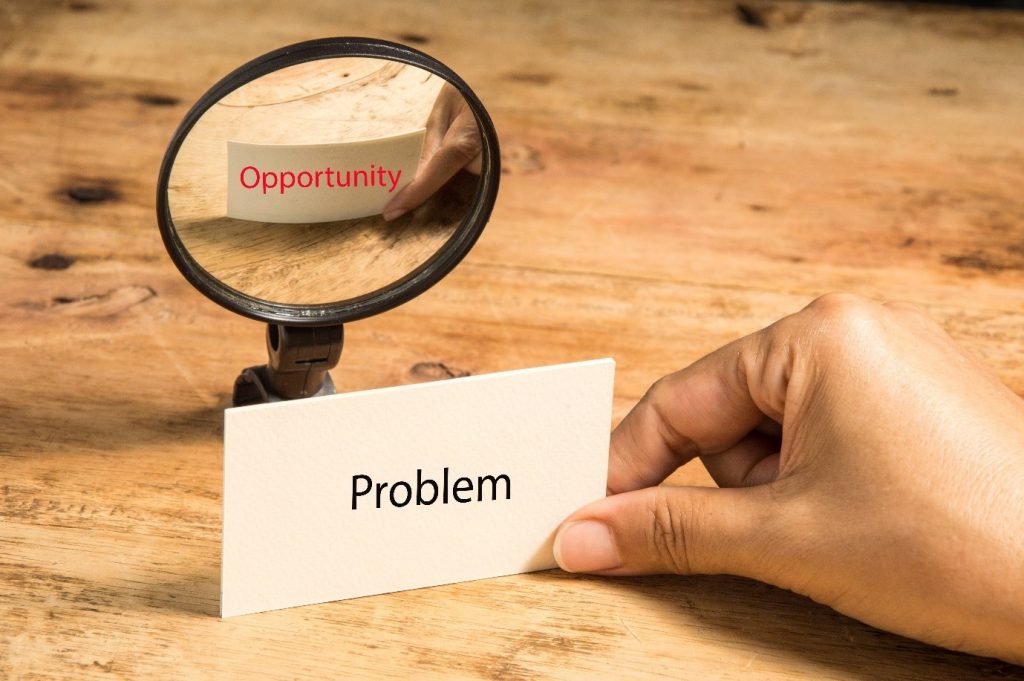[vc_row][vc_column][vc_column_text]Ah, problems. We all have them. Sometimes they’re huge ones (yes, thanks 2020!) and sometimes they aren’t. What do we classify as a problem though? I’d say it’s something that we want to solve and overcome. But within each problem there hides an opportunity. The COVID crisis created a problem for everyone to continue daily life without meeting in person. Luckily Zoom was there to solve everyone’s problems and create new opportunities to reinvent how we interact with each other.
What if I let you in on a secret to successful corporate partnership sales? It’s all about solving problems – but not just the pressing social issues. It’s the problems that the corporate partner is experiencing themselves. Here’s where I see a lot of charities go wrong. They think the problem they’re trying to solve is all about the beneficiary and the business can help solve that by providing the charity with funding to fix the issue. (Look at me, I’m describing the problem for you now.)
I’ll give you two scenarios of corporate partnership sales. Charity A really wants to partner with a business. They write a proposal and base it around solving the problem for their beneficiary. ‘Here’s Johnny and he has xxx wrong with him, we know how to help Johnny. We can do x, y and z to solve this problem for Johnny and this will make his whole life a lot better. To assist Johnny though we need your help. If you can provide us with $xxx you will be able to give Johnny a better life.’ Charity A is going about partnerships as a way of fundraising. Of course, a business will care about Johnny’s problem, they’re only human after all. Charity A will have some success with this approach and will win some low-level partnerships based on goodwill.
But this approach cannot be defined as a partnership as it’s purely transactional. The business has bought into solving Johnny’s problem and can feel good about that. What about their own problems though?
The first step in successful corporate partnership sales is defining the problem and presenting what you have as the solution to overcoming that problem. If you’re ‘selling’ to a business, then it’s the business’ problems that you should be uncovering and then outlining why partnering with you is not only the solution to the pressing social issue core to your charity but the solution to their business problem.
Let’s take a walk-through scenario two of corporate partnership sales. Charity B is meeting with a business and during the discovery meeting uncovers that the business has a new competitor who is eating into their market share. They do this by asking the right questions to really understand what the issue is and how big the problem is. How is business? What is keeping them up at night? What have they already tried to do to fix this problem? Did it work? Why/ why not? How much have they already spent trying to fix this problem? If you were able to fix this problem how much would it save them?
With these detailed questions charity B is building a great understanding of the business’ problem. They can empathise with them and present the solution of why partnering with them can help fix the problem by increasing the loyalty of their customers.
How do they do this though? By presenting the same story of Johnny and how his story really resonated with their donors. Donors who are of a very similar age, location, economic status and demographic to the business’ customers. The charity knows that this is a cause that will really resonate with the corporate’s customers and increase your Net Promoter Score
Charity B is much more likely to be successful because they have taken the time to understand the issues of their corporate partner, they’ve chosen a partner that aligns with their core constituents and they’ve presented a solution to the business’ pressing issue. They also know what budget range the business has to invest in a partnership.
Please don’t be charity A and take the time to discover what your potential partner’s issues are. If you’re going out to pitch for a new partner can you answer this question; what would happen to my potential partners business if they didn’t partner with me? If you can show that the business would be disadvantaged then you are demonstrating compelling reasons for a business to partner with your charity and you’ll have a way more successful pitch.
What I would really love to see, is charities in Australia becoming more strategic in the way that they pitch to corporates. What if they identified the societal problem, they defined the business’ problem and presented their organisation as having the best solution to the business’ problems and for the 1000’s of people who are just like Johnny. It will elevate your partnerships to being truly win-win-win. Can you inspire them to imagine what an ideal future will look like, articulate why you are specifically asking them to contribute to this issue and can demonstrate your credentials as to why you are the only partner that make this happen? If you can then you’ll be creating a partnership that is good for your organisation, good for their business and good for society.
When we’re seeing this type of partnership as the norm in Australia and not the exceptional then our work is done. We’ll be popping champagne and celebrating the wonderful world that is growing around us. Do you see this as the future of your partnerships program? We know how to get you there. Talk to us about setting your corporate partnership sales up for success. Contact us now on info@stellarpartnerships.com for a free 30-minute consultation to find out where you’re at and how to hit your partnership goals.
[/vc_column_text][/vc_column][/vc_row][vc_row][vc_column width=”1/2″][vc_custom_heading text=”Don’t miss a blog. Sign up to our weekly newsletter” use_theme_fonts=”yes”][vc_column_text]
[/vc_column_text][/vc_column][vc_column width=”1/2″][/vc_column][/vc_row][vc_row][vc_column][vc_empty_space height=”30px”][/vc_column][/vc_row]

